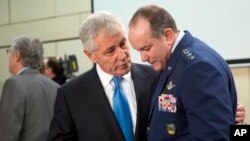Several European defense ministers spoke out on Thursday against sending weapons to the Ukrainian army, pointing to a potential transatlantic split if Washington decides to supply arms.
The United States is considering whether to provide weapons to Ukraine in its fight against Russian-backed separatists, although no decision has been made, senior administration officials said on Monday.
Ukrainian President Petro Poroshenko has also called on NATO states to send weapons to his country.
Several European defense ministers attending a NATO meeting in Brussels voiced opposition to sending weapons to Ukraine, fearing it could fuel the conflict.
Meanwhile, U.S. lawmakers will write legislation requiring the United States to send arms to Ukraine if President Barack Obama does not move to send weapons, Republican Senator John McCain said on Thursday.
McCain led a group of Republican and Democratic senators at a news conference in pressing Obama to send arms to help Kyiv defend itself.
Russia has said it would consider any U.S. arms sent to Kyiv to be a security threat.
Need for 'pressure'
“More weapons in this area will not bring us closer to a solution, and will not end the suffering of the population,” German Defense Minister Ursula von der Leyen told reporters.
“We need to put a lot of pressure on the separatists and Russia in an economic and political way to find a solution at the table and not on the (battle)field because to give input to a potential escalation is not a good solution. We need a sustainable political solution for this area,” von der Leyen said.
Dutch Defense Minister Jeanine Hennis-Plasschaert said she believed most allies, “but in particular the Netherlands, will insist on non-lethal support to Ukraine. Political dialog is the only way out of the crisis.”
Danish Defense Minister Nicolai Wammen said his country had no plans to supply weapons to Ukraine.
British Defense Secretary Michael Fallon said London would “see what more we can do in the way of training and equipment that is non-lethal that can help the Ukrainians better protect themselves against the onslaught that they are now exposed to.”
No military solution
U.S. Air Force General Philip Breedlove, the Supreme Allied Commander, Europe, said Russian supply of heavy weaponry and assistance to rebels in eastern Ukraine caused “much concern” and the Ukrainian people had a right to defend themselves.
But he cautioned that the situation in Ukraine had no military solution and any action by Western nations should be aimed at creating “conditions that support all parties to come to the table” to resolve the problem.
“Arms will not change that,” Breedlove told reporters.
But he declined to be drawn specifically on whether he supported providing defensive lethal weapons to Ukraine, as has been reported in some media.
“I've made my specific advice to ... both my U.S. chain of command and my NATO chain of command. They are taking my advice under consideration,” Breedlove said, declining further comment.
The U.S. Ambassador to NATO, Douglas Lute, said on Wednesday that, in reaching a decision on arming Ukraine, he believed the U.S. government would be careful not to undermine EU-U.S. unity on Russian sanctions.
A group of former U.S. officials, including former top diplomatic and military representatives to NATO, recommended recently that the U.S. provide Ukraine with defensive lethal weapons, such as anti-tank missiles.
Securing NATO borders
NATO defense ministers also signed off on a network of command centers in Eastern Europe to rapidly reinforce the region in the event of any threat from Russia, as well as a bigger rapid reaction force and two new regional headquarters.
NATO Secretary-General Jens Stoltenberg said the measures, part of the alliance's response to Russia's annexation of Ukraine's Crimea, amounted to "the biggest reinforcement of our collective defense" since the end of the Cold War 25 years ago.
With East-West tensions running at their highest since the Cold War era, NATO has made clear it will not intervene in Ukraine but will bolster the defenses of nervous eastern allies who were under Moscow's domination for four decades until 1989.
Rapid reaction force
Ministers were expected to approve more than doubling the size of NATO's existing rapid reaction force, to 30,000 soldiers from 13,000, and to flesh out details of a 5,000-strong "spearhead" force with a faster reaction time of only days.
The alliance will establish a new northeastern regional headquarters in Poland and a smaller southeastern headquarters in Romania.
Six command centers, staffed by national and NATO officers, will be set up in Poland, Romania, Bulgaria and the three Baltic states to plan exercises and organize reinforcements for those countries in an emergency.
Ministers also discussed growing concerns within NATO about Russia's nuclear strategy and indications that Russian military planners may be lowering the threshold for using atomic weapons in any conflict, diplomats said.





